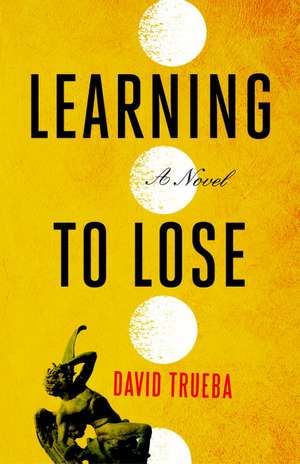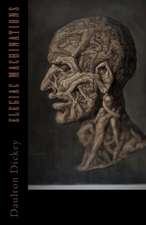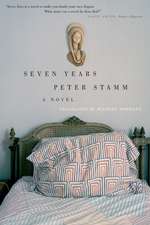Learning to Lose
Autor David Trueba Traducere de MARA FAYE LETHEMen Limba Engleză Paperback – 31 mai 2010
Set against the maze of Madrid’s congested and contested streets, Learning to Lose follows these four individuals as they swerve off course in unexpected directions. Each of them is dodging guilt and the fear of failure, but their shared search for happiness, love, purity, redemption, and, above all, a way to survive, forms a taut narrative web that binds the characters together.
From one of Spain’s most celebrated contemporary writers, Learning to Lose is a lucid and gripping view into the complexities of lives overturned and into the capriciousness of modern life, with its intoxicating highs and devastating lows.
Preț: 112.58 lei
Nou
Puncte Express: 169
Preț estimativ în valută:
21.55€ • 22.41$ • 18.06£
21.55€ • 22.41$ • 18.06£
Carte disponibilă
Livrare economică 20 februarie-06 martie
Preluare comenzi: 021 569.72.76
Specificații
ISBN-13: 9781590513224
ISBN-10: 1590513223
Pagini: 579
Dimensiuni: 142 x 209 x 40 mm
Greutate: 0.59 kg
Editura: Other Press (NY)
ISBN-10: 1590513223
Pagini: 579
Dimensiuni: 142 x 209 x 40 mm
Greutate: 0.59 kg
Editura: Other Press (NY)
Notă biografică
David Trueba was born in Madrid in 1969 and has been successful both as a novelist and as a screenwriter. La buena vida was his widely acclaimed debut as a film director and was followed by Obra maestra, Soldados de Salamina, Bienvenido a casa, and La silla de Fernando. He is the author of two previous novels, Cuatro amigos and Abierto toda la noche. Learning to Lose won the Critics Award in 2009 and marks Trueba’s English-language debut.
Mara Faye Lethem is the translator of Spanish and Catalan authors such as
Albert Sánchez Piñol, Juan Marsé, Javier Calvo, Jorge Semprún, and Pablo DeSantis. Born and raised in Brooklyn, New York, she has lived in Barcelona since 2003.
Mara Faye Lethem is the translator of Spanish and Catalan authors such as
Albert Sánchez Piñol, Juan Marsé, Javier Calvo, Jorge Semprún, and Pablo DeSantis. Born and raised in Brooklyn, New York, she has lived in Barcelona since 2003.
Extras
Aurora broke her hip in a completely unspectacular way. Getting out of the bathtub, she lifted her leg over the edge and suddenly heard a small crunch. She felt a slight shiver and her legs turned rubbery. She fell slowly, with time to brush the tips of her fingers along the wall tiles and prepare for the impact. Her elbow hit the fixtures causing a cold pain and a second later she was lying down, naked and overcome, on the still-damp bottom of the bathtub. Papá, she wanted to shout, but her voice came out weak. She tried to raise her voice, but the best she could do was emit a repetitive, well spaced out lament.
Papá…Papá…Papá.
The murmur reaches the little back room, where Leandro is reading the
newspaper. His first reaction is to think that his wife is calling him for another
one of her ridiculous requests, for him to get down a jar of spices that’s on too
high a shelf, to ask him something silly. So he answers with an apathetic what?
that gets no reply. He leisurely closes the newspaper and stands up. Later he will
be ashamed of the irritation he feels at having to stop reading. It’s always the
same, he sits down to read and she talks to him over the radio or the ringing
telephone. Or the doorbell sounds and she asks, can you get it? when he
already has the intercom receiver in his hand. He goes down the hallway until
he identifies where the monotonous call is coming from. There is no urgency in
Aurora’s voice. Perhaps fatalism. When he opens the bathroom door and finds
his fallen wife he thinks that she’s sick, dizzy. He looks for blood, vomit, but all
he sees is the white of the bathtub and her naked skin like a glaze.
Papá…Papá…Papá.
The murmur reaches the little back room, where Leandro is reading the
newspaper. His first reaction is to think that his wife is calling him for another
one of her ridiculous requests, for him to get down a jar of spices that’s on too
high a shelf, to ask him something silly. So he answers with an apathetic what?
that gets no reply. He leisurely closes the newspaper and stands up. Later he will
be ashamed of the irritation he feels at having to stop reading. It’s always the
same, he sits down to read and she talks to him over the radio or the ringing
telephone. Or the doorbell sounds and she asks, can you get it? when he
already has the intercom receiver in his hand. He goes down the hallway until
he identifies where the monotonous call is coming from. There is no urgency in
Aurora’s voice. Perhaps fatalism. When he opens the bathroom door and finds
his fallen wife he thinks that she’s sick, dizzy. He looks for blood, vomit, but all
he sees is the white of the bathtub and her naked skin like a glaze.
Recenzii
“…Trueba scores with his story about the need people have to connect to others, whether through sports, love or money.”—Cleveland Plain Dealer
“One part Paul Thomas Anderson's Magnolia, one part Paul Haggis' Crash, the rest is all David Trueba, modern day Madrid, and a narrative that pulsates with longing, lust and simmering rage. Don't dare pick it up if you have plans for the weekend, or for the rest of the day for that matter. It's that good. I was casting the adaptation in my mind as I tore through it. Vivid, real and raw, the novel is at once unsparing and entirely humane. Simply masterful.”—Joe McGinniss, Jr., author of The Delivery Man
“Learning to Lose is complex, powerful, surprising and most of all smart. David Trueba is the real thing. I had a lot of work on my desk and it is still on my desk. I have however read Mr. Trueba's novel. Enough said.”—Percival Everett, author of I Am Not Sidney Poitier
“One part Paul Thomas Anderson's Magnolia, one part Paul Haggis' Crash, the rest is all David Trueba, modern day Madrid, and a narrative that pulsates with longing, lust and simmering rage. Don't dare pick it up if you have plans for the weekend, or for the rest of the day for that matter. It's that good. I was casting the adaptation in my mind as I tore through it. Vivid, real and raw, the novel is at once unsparing and entirely humane. Simply masterful.”—Joe McGinniss, Jr., author of The Delivery Man
“Learning to Lose is complex, powerful, surprising and most of all smart. David Trueba is the real thing. I had a lot of work on my desk and it is still on my desk. I have however read Mr. Trueba's novel. Enough said.”—Percival Everett, author of I Am Not Sidney Poitier
Descriere
Set against the maze of Madrid's congested and contested streets, "Learning to Lose" follows four individuals as they swerve off course in unexpected directions, searching for a way to avoid or accept their losses.













